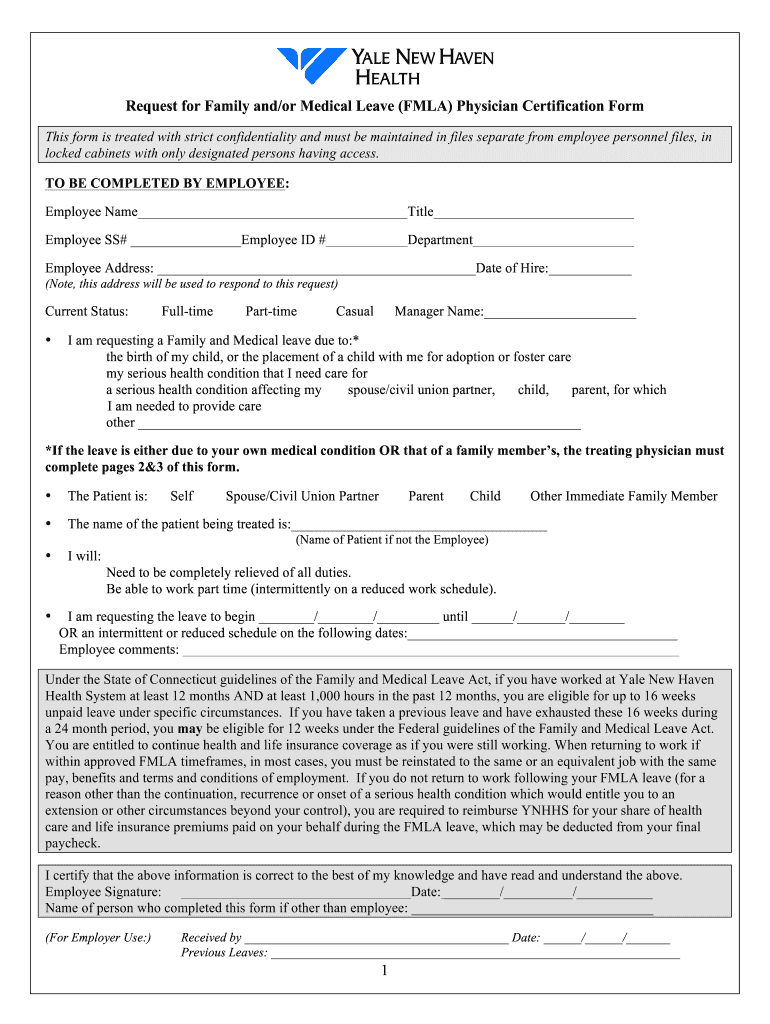Completing FMLA Paperwork for Family Members: A Guide

In the whirlwind of managing both a professional career and family responsibilities, life can present unforeseen challenges. One such challenge can be the necessity to provide care for a family member, which might necessitate time away from work. This is where the Family and Medical Leave Act (FMLA) becomes invaluable. FMLA provides eligible employees with up to 12 workweeks of unpaid, job-protected leave per year for specified family and medical reasons. However, navigating the FMLA paperwork can be a daunting task. This comprehensive guide aims to simplify the process for you, ensuring that you can provide the necessary care for your loved ones without undue stress or confusion.
Understanding the FMLA

Before diving into the paperwork, it’s crucial to understand what FMLA entails:
- Eligibility criteria:
- Employees must have worked for their employer for at least 12 months.
- Employees must have at least 1,250 hours of service during the 12 months prior to leave.
- The employer must employ at least 50 employees within a 75-mile radius.
- Qualifying reasons for leave:
- Birth and care of a newborn child.
- Placement with the employee of a child for adoption or foster care.
- Care for an immediate family member (spouse, child, or parent) with a serious health condition.
- Medical leave when the employee is unable to work because of a serious health condition.

Step-by-Step Guide to FMLA Paperwork

Here’s how you can navigate through the FMLA paperwork process:
1. Request for Leave:

- Inform your employer: Start by notifying your employer of your need for leave. This should be done in writing, stating the reason and expected duration.
- Download or request the necessary forms:
- WH-380E (Certification of Health Care Provider for Employee’s Serious Health Condition)
- WH-380F (Certification of Health Care Provider for Family Member’s Serious Health Condition)
- WH-381 (Notice of Eligibility and Rights & Responsibilities)
⚠️ Note: Ensure to download the latest version of the forms to avoid any compliance issues.
2. Fill Out the Forms

- Employee section: Fill out your part of the form, detailing your contact information, reason for leave, and any necessary employer information.
- Health care provider section: This must be completed by your or your family member’s health care provider:
- They will need to describe the nature of the illness or injury, expected duration of care, and any required intermittent leave.
- The provider should detail if the leave is due to a condition that makes you unable to perform your work duties or requires your presence to care for a family member.
| Form | Purpose | Completed By |
|---|---|---|
| WH-380E | Employee's Health Condition | Employee & Health Care Provider |
| WH-380F | Family Member's Health Condition | Family Member & Health Care Provider |
| WH-381 | Notice of Eligibility | Employer |

3. Submission

- Once all forms are completed, submit them to your employer.
- Keep copies for your records.
- Your employer must designate the leave as FMLA within five business days of having enough information to do so.

4. Approval Process

- Your employer will review the submitted documentation and determine your eligibility.
- You will receive a written Notice of Eligibility and Rights & Responsibilities (WH-381).
- If approved, you’ll be informed of the period of leave granted and any requirements regarding return-to-work fitness certification.
5. Leave Administration

- Tracking time: Keep track of your leave time used, as FMLA leave is tracked on a rolling calendar year or a fixed 12-month period, depending on your employer’s policy.
- Intermittent or reduced leave: If your or your family member’s condition requires intermittent leave or reduced work hours, this must be noted in the paperwork.
- Return to work: Discuss with your HR or supervisor about the return-to-work process, ensuring you are aware of any post-leave requirements.
🔹 Note: Employers can require a fitness-for-duty report if you took leave due to your own serious health condition.
This guide should help simplify the process of navigating through FMLA paperwork for family care. By understanding your rights, being prepared with the correct documentation, and maintaining open communication with your employer, you can support your family member during their time of need without sacrificing your job security or peace of mind.
What if my employer denies my FMLA leave?

+
If your employer denies your FMLA leave and you believe you are eligible, you might need to consult with an employment lawyer or HR professional to review your case. They can help determine if the denial was lawful or if you have grounds for an appeal or further legal action.
Can I take FMLA leave if I haven’t been with the company for a full year?

+
Unfortunately, to be eligible for FMLA leave, you must have worked for your employer for at least 12 months. This doesn’t need to be consecutive, but you must still meet the 1250 hours of work requirement in the 12 months prior to the leave.
How do I manage intermittent FMLA leave?

+
Intermittent FMLA leave involves taking leave in separate blocks of time or by reducing your usual work hours. Ensure you provide your employer with a schedule or an estimated frequency of your leave in advance to facilitate work planning.



